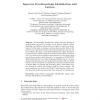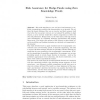85 search results - page 2 / 17 » Commitment Schemes and Zero-Knowledge Protocols |
EUROCRYPT
1999
Springer
13 years 9 months ago
1999
Springer
Abstract. We present the first efficient statistical zero-knowledge protocols to prove statements such as: – A committed number is a prime. – A committed (or revealed) number ...
PROVSEC
2010
Springer
13 years 3 months ago
2010
Springer
Zero-knowledge identification schemes solve the problem of authenticating one party to another via an insecure channel without disclosing any additional information that might be u...
FC
2005
Springer
13 years 10 months ago
2005
Springer
Abstract. This work introduces a new tool for a fund manager to verifiably communicate portfolio risk characteristics to an investor. We address the classic dilemma: How can an in...
ASIACRYPT
2000
Springer
13 years 9 months ago
2000
Springer
Abstract. We introduce weaker models for non-interactive zero knowledge, in which the dealer is not restricted to deal a truly random string and may also have access to the input t...
FOCS
2003
IEEE
13 years 10 months ago
2003
IEEE
We show how a polynomial-time prover can commit to an arbitrary finite set Ë of strings so that, later on, he can, for any string Ü, reveal with a proof whether Ü ¾ Ë or Ü ...


